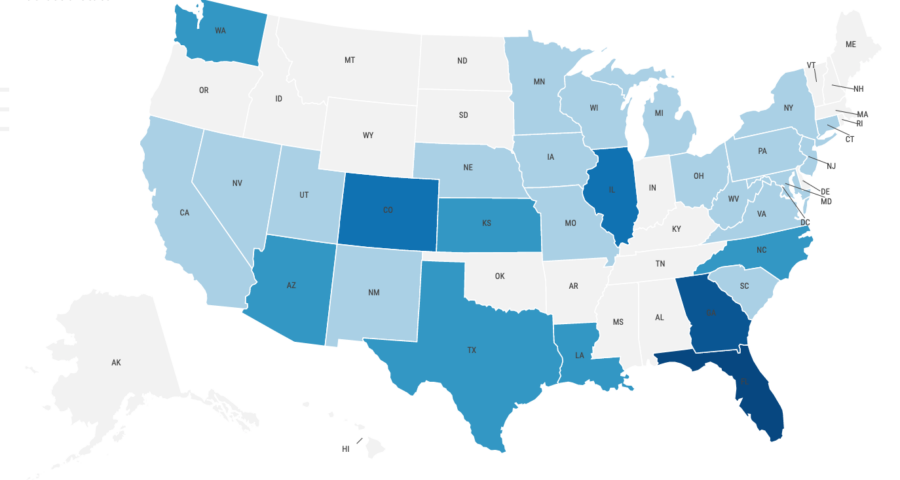The COVID-19 pandemic has upended American life and forced state and local governments to enact important policy decisions with incomplete or uncertain information. To help explain these decisions to the public, we’re launching an online repository of local, state and federal public records obtained through open-records requests called Documenting COVID-19 (documentingcovid19.
We will provide these materials free-of-charge to newsrooms and the public while allowing users to contribute other records and requests specific to COVID-19 public records.
The site allows users to search for relevant document sets and records by state or thematic tags. So far, we’ve compiled 50 document sets across 29 states and have published accompanying news stories with national outlets like The New York Times and The Washington Post and local outlets like Colorado Public Radio, The Kansas City Star and The Omaha World-Herald.
The site will be updated frequently, as we obtain records through open-records requests. But we’re also inviting newsrooms and the public to include their FOIA materials to this living archive so it can serve the larger public. If you’re interested in submitting materials and the resulting news coverage that came from it, please contact us.
For more information, please email us at info@documentingcovid19.io,
Our Team
Derek Kravitz, project lead
Derek is working on grant-funded initiatives in 2020-21 through Columbia and Stanford’s Brown Institute for Media Innovation. He is also an instructor for the Columbia Journalism School’s Stabile Center for Investigative Journalism, where he teaches research and reporting skills. From 2016 to 2019, he was the research director at ProPublica, the New York-based investigative nonprofit newsroom, and, for the past decade, has worked as a reporter and editor at The Wall Street Journal, The Associated Press and The Washington Post. Kravitz is a two-time Livingston Award finalist — for work with The New Yorker and ProPublica — and projects he edited or reported have won prizes from the George Polk Awards, the Alfred I. duPont-Columbia University Awards, the Online News Association, Investigative Reporters and Editors and the Deadline Club. He has also been apart of three teams that have been finalists for the Pulitzer Prize. You can email him at drk2134@columbia.edu.
Researchers on this project come from across the Computer Science, History and Journalism departments at Columbia University.
Georgia Gee, postgraduate research scholar (Journalism, Stabile Center, 2020)
Georgia Gee is a British investigative journalist based in New York City. She graduated from the Columbia Journalism School’s Stabile program in 2020 and her journalism work has largely focused on social issues, immigration and international human rights. Gee has been featured in various British newspapers and New York-based outlets and was selected as a 2020 journalism fellow with FASPE, Fellowships at Auschwitz for the Study of Professional Ethics. You can reach her at gmg2172@columbia.edu.
Arusha Kelkar (Computer Science, 2020)
Arusha Kelkar is currently pursuing a master’s degree in Data Science at Columbia University. She completed her Bachelor of Technology degree in Computer Science and Engineering in India and her key interests include creating data visualizations, finding patterns in data and enhancing her knowledge about machine learning techniques. You can reach her at ak4432@columbia.edu
Kyra Senese (Journalism, Stabile Center, 2020)
Kyra Senese is a Chicago-based investigative journalist who graduated from Columbia Journalism School’s Stabile program in 2020. She previously worked as a business reporter in Chicago and contrubuted stories for the Chicago Tribune, where she reported on local news. Senese earned her bachelor’s degree from Columbia College Chicago, where she was editor of the college’s weekly student-run newspaper, the Columbia Chronicle. You can reach her at kas2317@columbia.edu.
Kanak Manhip Singh (Computer Science, 2020)
Kanak is a Data Science graduate student at Columbia University and is passionate about building software to create an impact. He received a BSc in Math and Computer Science from Harvey Mudd College in California in 2016, and worked as a software developer for three years after that. He is now looking to leverage Data Analytics and Machine Learning to solve business problems, and is happy to collaborate on meaningful projects. You can reach him at kmsingh245@gmail.com.
Ivan Ugalde (Computer Science, 2020)
Ivan Ugalde graduated from Columbia’s Data Science program with a master’s degree in 2020 and has a bachelor’s degree in Actuarial Science. Before joining the Documenting COVID-19 project, Ugalde worked for more than 10 years for the insurance industry and launched a startup. His research interests include using Machine Learning and data to address societal ills. You can reach him at ivan.u@columbia.edu
Qiaoge Zhu (Computer Science, 2020)
Qiaoge Zhu is currently pursuing a Master of Science degree in Data Science at Columbia University. She has a bachelor’s degree in Statistics and Mathematics from University of Illinois at Urbana-Champaign and worked on analyzing Covid-19-related complaints by different factors such as region and date range to get insights. She also worked on performing frequency count for these complaints. You can reach her at qz2383@columbia.edu
Documenting COVID-19 is a project of the Brown Institute for Media Innovation with additional funding by FRONTLINE PBS, Columbia Journalism School’s Stabile Center for Investigative Journalism, the Fund for Investigative Journalism and National Geographic.

